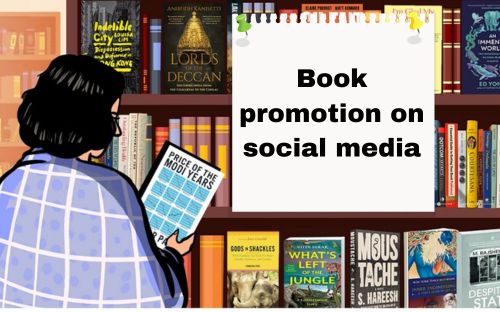
As an author, you know that writing a great book is only half the battle. The other half is promoting it effectively. In today's digital age, social media has become an essential tool for book promotion. In this blog, we'll explore why social media is an effective tool for book promotion and which social media platforms are best for book promotion.
Wide reach: Social media platforms have a massive user base, which provides a great opportunity to reach a large number of potential readers. For instance, Facebook alone has over 2.8 billion active users, while Twitter has over 330 million. By using social media platforms, you can reach a wider audience, including those who might not have found your book through traditional marketing channels.
Targeted advertising: Social media platforms allow you to target specific demographics, interests, and behaviors. This means you can tailor your book promotion to reach the people most likely to be interested in it. For example, if you've written a romance novel, you can target people who have expressed an interest in romance novels or who follow popular romance authors.
Engagement: Social media is an excellent platform for engaging with your readers. You can use it to build a relationship with your audience by responding to comments, sharing behind-the-scenes glimpses of your writing process, and creating interactive content such as quizzes or polls. This engagement can help build a loyal fan base and increase word-of-mouth marketing for your book.
Cost-effective: Social media is generally a cost-effective way to promote your book. While some platforms offer paid advertising, many promotional tactics on social media are free. For example, you can share links to your book, post updates about your writing journey, or collaborate with book bloggers or bookstagrammers for free.
Facebook: With over 2.8 billion active users, Facebook is an excellent platform for book promotion. You can create a dedicated Facebook page for your book or author brand, post updates about your writing journey, share links to your book, and engage with your audience through comments and messages. Facebook also offers paid advertising options to target specific demographics.
Twitter: Twitter is a fast-paced platform that's perfect for building a community around your book. You can use hashtags to reach new audiences, share updates about your book, and engage with your followers through retweets and replies. Twitter also allows you to run paid advertising campaigns.
Instagram: Instagram is a highly visual platform that's perfect for showcasing your book through images and videos. You can create a dedicated Instagram account for your book or author brand and share photos of your book cover, behind-the-scenes glimpses of your writing process, and images that align with your book's themes. Instagram also offers paid advertising options.
Goodreads: Goodreads is a social media platform specifically designed for book lovers. You can create an author profile, interact with readers, join book clubs, and promote your book through giveaways and book reviews. Goodreads is an excellent platform for reaching highly engaged readers who are actively looking for their next book to read.
In conclusion, social media is an effective tool for book promotion due to its wide reach, targeted advertising, engagement opportunities, and cost-effectiveness. When choosing which social media platforms to use for book promotion, consider your target audience, book genre, and the type of content you want to create. By using social media platforms effectively, you can reach a wider audience and increase book sales.
Relevance: By identifying your target audience, you can create content that is relevant to their interests, making it more likely they will engage with your posts and share them with others. This relevance can lead to higher engagement rates, which can help increase your visibility on social media.
Cost-effectiveness: Identifying your target audience can also save you money when it comes to social media advertising. By targeting specific demographics, interests, and behaviors, you can ensure that your advertising budget is spent on reaching people who are most likely to be interested in your book.
Improved sales: Finally, identifying your target audience can lead to improved sales. By focusing your promotion efforts on people who are most likely to be interested in your book, you can increase the chances of converting them into readers and ultimately, buyers.
Analyze your book: The first step in identifying your target audience is to analyze your book. What is the genre? Who is the protagonist? What themes does it explore? Understanding the characteristics of your book can help you identify the type of people who would be most interested in reading it.
Analyze your current audience: If you already have a social media presence, analyze your current audience. Look at the demographics of your followers, such as age, gender, and location. This information can help you identify the type of people who are already interested in your book and tailor your promotion efforts accordingly.
Research your genre: Researching your book genre can help you identify the type of people who are most likely to be interested in your book. Look at the types of people who follow popular authors in your genre, the types of books that are currently popular, and the type of content that is being shared.
Use social media analytics: Social media platforms offer analytics tools that can help you identify your target audience. These tools can provide insights into your followers' demographics, interests, and behaviors. Use this information to tailor your promotion efforts and reach people who are most likely to be interested in your book.
In conclusion, identifying your target audience on social media is an essential step in promoting your book effectively. By understanding your audience, you can create content that is relevant to their interests, save money on advertising, and ultimately, improve your sales. Use the steps outlined above to identify your target audience and tailor your promotion efforts to reach them effectively.